中学教材全解八年级英语(下)
中学教材全解八年级英语下
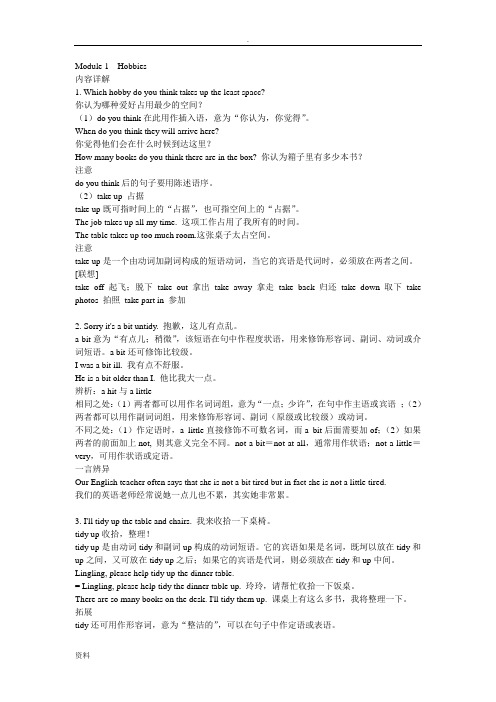
Module 1 Hobbies内容详解1. Which hobby do you think takes up the least spacc?你认为哪种爱好占用最少的空间?(1)do you think在此用作插入语,意为“你认为,你觉得”。
When do you think they will arrive here?你觉得他们会在什么时候到达这里?How many books do you think there are in the box? 你认为箱子里有多少本书?注意do you think后的句子要用陈述语序。
(2)take up 占据take up既可指时间上的“占据”,也可指空间上的“占据”。
The job takes up all my time. 这项工作占用了我所有的时间。
The table takes up too much room.这张桌子太占空间。
注意take up是一个由动词加副词构成的短语动词,当它的宾语是代词时,必须放在两者之间。
[联想]take off 起飞;脱下take out 拿出take away 拿走take back 归还take down 取下take photos 拍照take part in 参加2. Sorry it's a bit untidy. 抱歉,这儿有点乱。
a bit意为“有点儿;稍微”,该短语在句中作程度状语,用来修饰形容词、副词、动词或介词短语。
a bit还可修饰比较级。
I was a bit ill. 我有点不舒服。
He is a bit older than I. 他比我大一点。
辨析:a hit与a little相同之处:(1)两者都可以用作名词词组,意为“一点;少许”,在句中作主语或宾语;(2)两者都可以用作副词词组,用来修饰形容词、副词(原级或比较级)或动词。
不同之处:(1)作定语时,a little直接修饰不可数名词,而a bit后面需要加of;(2)如果两者的前面加上not, 则其意义完全不同。
中学教材全解·八年级英语下

UNIT 8Have you read Treasure Island yet?你读过《金银岛》吗?学习目标全解Section A英汉对译教材原文Language Goal: Talk about recent events and experiences(1a)Have you heard of these books? Check (√) the ones you know. ______ Alice in Wonderland/‟wʌndə(r)lænd/______ Little Women______ Treasure/‟treʒə(r)/Island/‟aɪləd/______ Oliver/‟ɒlɪvə(r),‟ɑ:lɪvə(r)/Twist/twɪst/______ Robinson Crusoe/‟kru:səʊ/______Tom Sawyer/‟sɔ:jə(r)/汉语译文语言目标:谈论最近发生的事件和经历你听说过这些书吗?用(√)标出你知道的书名。
《爱丽丝梦游仙境》《小妇人》《金银岛》《雾都孤儿》《鲁滨逊漂流记》《汤姆·索亚历险记》听录音并完成表格。
(1c) Practice the conversation. Then talk about the other books in 1a. A: Have you read Little Women yet?B: No, I haven‟t. Have you?A: Yes, I‟ve already read it.B: What‟s it like?A: It‟s fantastic.练习对话。
然后谈论1a中其他的书。
你读过《小妇人》吗?不,我没有读过。
你读过了吗?是的,我已经读过了。
这本书怎么样?它棒极了。
(2a) Listen. Who has read these books? (Circle) the names.1. Treasure Island Mark/Tina2. Oliver Twist Mark/Tina3. Robinson Crusoe Mark/Tina4. Tom Sawyer Mark/Tina听录音。
八年级下册英语人教版中学教材全解

八年级下册英语人教版中学教材全解全文共3篇示例,供读者参考篇1Title: Complete Guide to the 8th Grade English Textbook of People's Education EditionIntroduction:The 8th Grade English textbook from the People's Education Edition is a comprehensive and engaging resource for students to enhance their language skills. This guide provides a detailed explanation of each unit, along with tips and strategies to help students improve their understanding and proficiency in English.Unit 1: FriendsIn this unit, students will learn vocabulary related to friendship and relationships. They will also practice using possessive pronouns and present continuous tense. To enhance learning, students can engage in role-plays and group discussions to apply the language in real-life situations.Unit 2: HealthThis unit focuses on health-related vocabulary and grammar structures such as modal verbs for advice and should/shouldn't for giving recommendations. Students can participate in debates on topics like healthy eating and exercise to strengthen their speaking and critical thinking skills.Unit 3: EnvironmentIn this unit, students will explore environmental issues and vocabulary. They will also learn about conditional sentences and ways to express opinions. To deepen understanding, students can work on projects like creating posters or presentations on environmental conservation.Unit 4: TravelThe travel unit introduces students to travel-related vocabulary and phrasal verbs. They will also practice using past simple tense and superlatives to describe their travel experiences. To enhance learning, students can write travel blogs or narratives to share their adventures with their peers.Unit 5: TechnologyIn this unit, students will learn about technology vocabulary and expressions. They will also practice using future tenses and comparatives to discuss advancements in technology. To furthertheir knowledge, students can research and present on a technological innovation that interests them.Unit 6: CultureThe culture unit explores cultural diversity and vocabulary. Students will also learn about reported speech and ways to express cultural norms and traditions. To broaden their perspectives, students can participate in cultural exchange activities or interviews with people from different backgrounds.Unit 7: EducationThis unit focuses on educational topics and vocabulary. Students will practice using passive voice and relative clauses to discuss education systems and experiences. To strengthen their language skills, students can engage in debates on educational reform and policies.Unit 8: FutureThe future unit introduces students to future goals and aspirations. They will learn about modal verbs of possibility and future perfect tense to discuss their future plans. To prepare for the future, students can create vision boards or presentations outlining their dreams and ambitions.Conclusion:The 8th Grade English textbook of People's Education Edition offers a comprehensive and engaging curriculum to help students improve their language skills. By utilizing the tips and strategies in this guide, students can enhance their understanding and proficiency in English while exploring a range of interesting and relevant topics.篇2Title: A Comprehensive Guide to Grade 8 English Textbook from People's Education PressIntroduction:Grade 8 English textbooks from People's Education Press provide a solid foundation for students to enhance their language skills. In this document, we will provide a detailed analysis and explanation of the entire curriculum covered in the textbook. From grammar rules to reading comprehension exercises, this guide aims to help students master the English language effectively.Chapter 1: The World of EnglishIn this chapter, students are introduced to the English language and its importance in the global context. They learn about basic greetings, introductions, and common expressionsused in daily conversations. The chapter also covers the basics of pronunciation, spelling, and sentence structure.Chapter 2: Parts of SpeechStudents learn about the eight parts of speech in English - nouns, pronouns, verbs, adjectives, adverbs, prepositions, conjunctions, and interjections. They are taught how to identify and use each part of speech correctly in sentences.Chapter 3: Verbs and TensesThis chapter focuses on verbs and their tenses. Students learn about the different tenses in English - past, present, and future. They practice conjugating verbs in different tenses and understanding their usage in sentences.Chapter 4: Sentence StructureStudents learn how to construct sentences usingsubject-verb agreement, word order, and punctuation. They practice writing sentences with varying complexity and learn how to avoid common mistakes in sentence structure.Chapter 5: Reading ComprehensionIn this chapter, students are introduced to various reading passages and comprehension exercises. They learn how toanalyze and understand the main ideas, supporting details, and implicit meanings in different types of texts.Chapter 6: Writing SkillsStudents practice writing descriptive, narrative, expository, and persuasive essays. They learn how to organize their thoughts, develop ideas, and use proper grammar, punctuation, and vocabulary in their writing.Conclusion:The Grade 8 English textbook from People's Education Press offers a comprehensive curriculum that covers all aspects of the English language. By mastering the content in this textbook, students can improve their language skills and become confident English speakers and writers.篇3Title: Comprehensive Explanation of the Eighth Grade English Textbook of People's Education PressIntroduction:The eighth grade English textbook of People's Education Press covers a wide range of topics and language points, providing students with a comprehensive understanding of theEnglish language. In this document, we will provide a detailed explanation of each unit, including grammar points, vocabulary, and exercises, to help students better grasp the content of the textbook.Unit 1: My familyThis unit focuses on introducing family members and describing their relationships. Students will learn possessive pronouns, possessive adjectives, and subject pronouns to talk about their families. The vocabulary includes words such as father, mother, brother, sister, etc. The exercises in this unit will help students practice using possessive pronouns and adjectives correctly.Unit 2: Friends around usIn this unit, students will learn to talk about their friends and describe their personalities. The grammar points covered include adjectives to describe personality, the present continuous tense, and comparative adjectives. Students will also expand their vocabulary with words such as kind, generous, friendly, etc. Through exercises, students will practice forming sentences using the present continuous tense and comparative adjectives.Unit 3: Daily routinesThis unit focuses on describing daily routines and talking about activities that people do. Students will learn the present simple tense, adverbs of frequency, and time expressions to talk about their daily schedules. The vocabulary includes words such as wake up, brush teeth, have breakfast, etc. Exercises in this unit will help students practice using the present simple tense and adverbs of frequency correctly.Unit 4: My school lifeIn this unit, students will learn vocabulary related to school subjects, extracurricular activities, and school facilities. The grammar points covered include countable and uncountable nouns, school subjects, and expressions of preference. Exercises in this unit will help students practice using countable and uncountable nouns correctly and expressing their preferences.Unit 5: Travelling aroundThis unit focuses on talking about travel experiences and describing different places. Students will learn vocabulary related to travel, modes of transport, and tourist attractions. The grammar points covered include the present perfect tense, adverbs of time, and prepositions of place. Exercises in this unit will help students practice using the present perfect tense and adverbs of time correctly.Conclusion:The eighth grade English textbook of People's Education Press provides students with a solid foundation in English grammar and vocabulary. By mastering the language points and vocabulary presented in each unit, students will be able to communicate effectively in English and develop their language skills further. We hope this comprehensive explanation of the textbook will help students achieve success in their English studies.。
中学教材全解 八年级英语下 外语教研版 教材听力原文译文
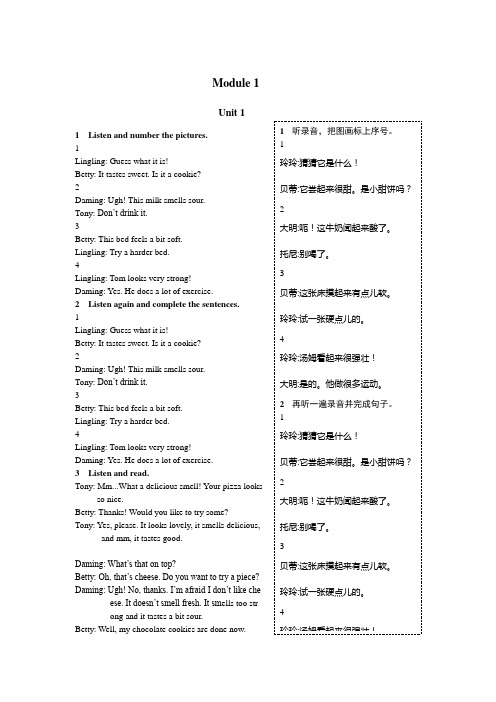
Module 1 Unit 11Listen and number the pictures.1Lingling: Guess what it is!Betty: It tastes sweet. Is it a cookie?2Daming: Ugh! This milk smells sour.Tony: Don’t drink it.3Betty: This bed feels a bit soft.Lingling: Try a harder bed.4Lingling: Tom looks very strong!Daming: Yes. He does a lot of exercise.2Listen again and complete the sentences.1Lingling: Guess what it is!Betty: It tastes sweet. Is it a cookie?2Daming: Ugh! This milk smells sour.Tony: Don’t drink it.3Betty: This bed feels a bit soft.Lingling: Try a harder bed.4Lingling: Tom looks very strong!Daming: Yes. He does a lot of exercise.3Listen and read.Tony: Mm...What a delicious smell! Your pizza looks so nice.Betty: Thanks! Would you like to try some?Tony: Yes, please. It looks lovely, it smells delicious, and mm, it tastes good.Daming: What’s that on top?Betty: Oh, that’s cheese. Do you want to try a piece? Daming: Ugh! No, thanks. I’m afraid I don’t like che- ese. It doesn’t smell fresh. It sm ells too str-ong and it tastes a bit sour.Betty: Well, my chocolate cookies are done now. 1听录音,把图画标上序号。
八下英语教材全解电子版薛金星
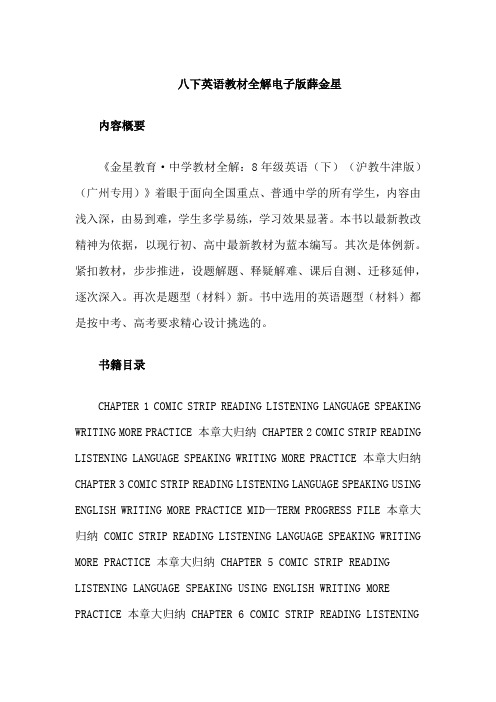
八下英语教材全解电子版薛金星内容概要《金星教育·中学教材全解:8年级英语(下)(沪教牛津版)(广州专用)》着眼于面向全国重点、普通中学的所有学生,内容由浅入深,由易到难,学生多学易练,学习效果显著。
本书以最新教改精神为依据,以现行初、高中最新教材为蓝本编写。
其次是体例新。
紧扣教材,步步推进,设题解题、释疑解难、课后自测、迁移延伸,逐次深入。
再次是题型(材料)新。
书中选用的英语题型(材料)都是按中考、高考要求精心设计挑选的。
书籍目录CHAPTER 1 COMIC STRIP READING LISTENING LANGUAGE SPEAKING WRITING MORE PRACTICE 本章大归纳 CHAPTER 2 COMIC STRIP READING LISTENING LANGUAGE SPEAKING WRITING MORE PRACTICE 本章大归纳CHAPTER 3 COMIC STRIP READING LISTENING LANGUAGE SPEAKING USING ENGLISH WRITING MORE PRACTICE MID—TERM PROGRESS FILE 本章大归纳 COMIC STRIP READING LISTENING LANGUAGE SPEAKING WRITING MORE PRACTICE 本章大归纳 CHAPTER 5 COMIC STRIP READING LISTENING LANGUAGE SPEAKING USING ENGLISH WRITING MORE PRACTICE 本章大归纳 CHAPTER 6 COMIC STRIP READING LISTENINGLANGUAGE SPEAKING USING ENGLISH WRITING MORE PRACTICE FINAL PROGRESS FILE 本章大归纳章节摘录Be humorous.Learn to laugh at yourself and your weakness.Remember to smile to others. Respect the others.Everyone has his own idea.Learn how to listen to others'ideas withouttrying to make them accept yours. Be kind.If you are kind to others,they will usually be kind to you.There are hundreds of littlethings you can do to show kindness.Open the door for someone.Wave to a friend and so on. Don't complain.Learn to accept what you can't change,and work hard to change what youcan.No one is willing to hear you complaining all the time. Never give up.Even if you are faced with some closed-minded people,never give up.Andtry to find someone who will understand you. 21.Why do we need friends according to the passage? A.Friends can do everything for us. B.Friends can bring us happiness. C.Friends accept our ideas all the time. D.Without friends we could not live. 22.What's the first thing we should learn in order to make friends? A.To help others.B.To smile to others. C.To get along with others.D.To listen toothers'complaints. 23.Which of the following shows a sense of humor? A.Opening the door for plaining to others all the time. ughing at ourselves and our weakness.D.Finding someone who will understandus. 24.How many pieces of advice does the writer offer when we have trouble in making friends? A.Five.B.Seven.C.Nine.D.Eleven.。
14-15 中学教材全解 八年级英语下 外语教研版 教材听力原文译文
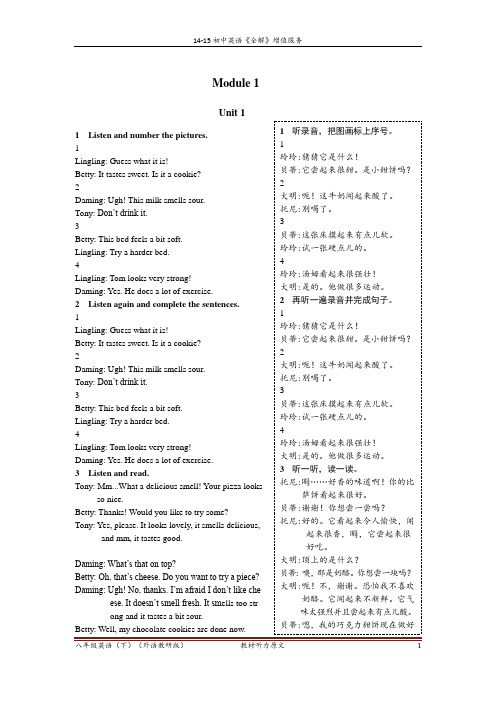
Module 1 Unit 11Listen and number the pictures.1Lingling: Guess what it is!Betty: It tastes sweet. Is it a cookie?2Daming: Ugh! This milk smells sour.Tony: Don’t drink it.3Betty: This bed feels a bit soft.Lingling: Try a harder bed.4Lingling: Tom looks very strong!Daming: Yes. He does a lot of exercise.2Listen again and complete the sentences.1Lingling: Guess what it is!Betty: It tastes sweet. Is it a cookie?2Daming: Ugh! This milk smells sour.Tony: Don’t drink it.3Betty: This bed feels a bit soft.Lingling: Try a harder bed.4Lingling: Tom looks very strong!Daming: Yes. He does a lot of exercise.3Listen and read.Tony: Mm...What a delicious smell! Your pizza looks so nice.Betty: Thanks! Would you like to try some?Tony: Yes, please. It looks lovely, it smells delicious, and mm, it tastes good.Daming: What’s that on top?Betty: Oh, that’s cheese. Do you want to try a piece? Daming: Ugh! No, thanks. I’m afraid I don’t like che- ese. It doesn’t smell fresh. It sm ells too str-ong and it tastes a bit sour.Betty: Well, my chocolate cookies are done now. 1听录音,把图画标上序号。
(中学教材全解)八年级英语下册 module 2 experiences 检测题(含详解) 外研版
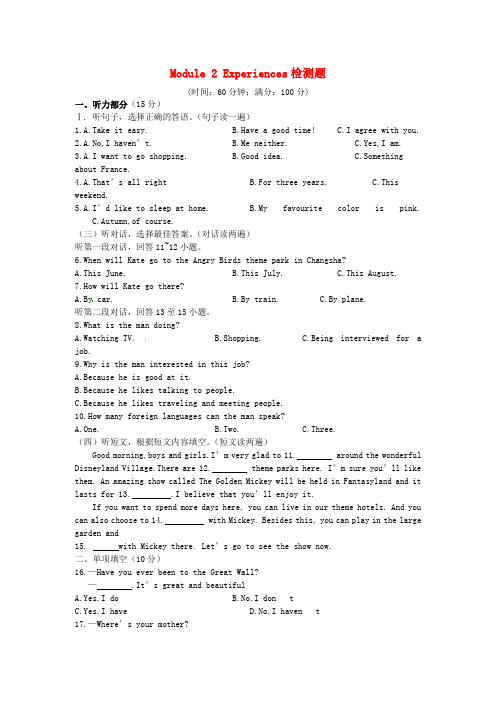
Module 2 Experiences检测题(时间:60分钟;满分:100分)一、听力部分(15分)Ⅰ.听句子,选择正确的答语。
(句子读一遍)1.A.Take it easy. B.Have a good time! C.I agree with you.2.A.No,I haven’t. B.Me neither. C.Yes,I am.3.A.I want to go shopping. B.Good idea. C.Something about France.4.A.That’s all right B.For three years. C.This weekend.5.A.I’d like to sleep at home. B.My favourite color is pink.C.Autumn,of course.(三)听对话,选择最佳答案。
(对话读两遍)听第一段对话,回答11~12小题。
6.When will Kate go to the Angry Birds theme park in Changsha?A.This June.B.This July.C.This August.7.How will Kate go there?A.By car.B.By train.C.By plane.听第二段对话,回答13至15小题。
8.What is the man doing?A.Watching TV.B.Shopping.C.Being interviewed for a job.9.Why is the man interested in this job?A.Because he is good at it.B.Because he likes talking to people.C.Because he likes traveling and meeting people.10.How many foreign languages can the man speak?A.One.B.Two.C.Three.(四)听短文,根据短文内容填空。
《中学教材全解》2013-2014学年八年级英语(下)(人教版)生词短语表+PDF版
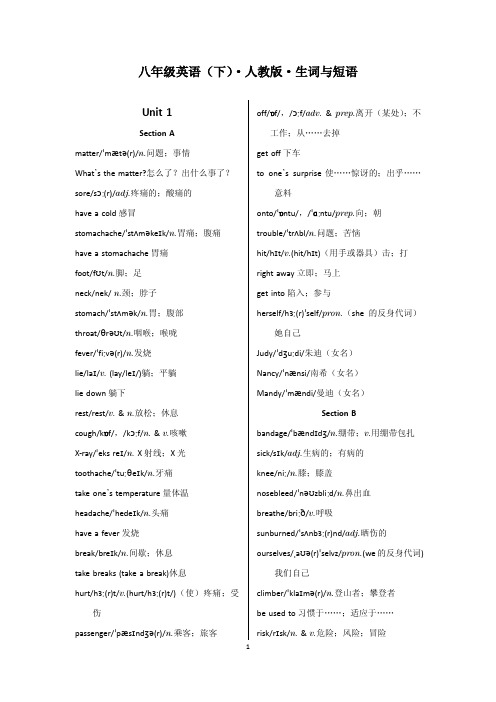
八年级英语(下)·人教版·生词与短语Unit1Section Amatter/ˈmætə(r)/n.问题;事情What’s the matter?怎么了?出什么事了?sore/s ɔ(r)/adj.疼痛的;酸痛的have a cold感冒stomachache/ˈstʌməkeɪk/n.胃痛;腹痛have a stomachache胃痛foot/fʊt/n.脚;足neck/nek/n.颈;脖子stomach/ˈstʌmək/n.胃;腹部throat/θrəʊt/n.咽喉;喉咙fever/ˈfi və(r)/n.发烧lie/laɪ/v.(lay/leɪ/)躺;平躺lie down躺下rest/rest/v.&n.放松;休息cough/kɒf/,/k ɔf/n.&v.咳嗽X-ray/ˈeks reɪ/n.X射线;X光toothache/ˈtuθeɪk/n.牙痛take one’s temperature量体温headache/ˈhedeɪk/n.头痛have a fever发烧break/breɪk/n.间歇;休息take breaks(take a break)休息hurt/h ɜ(r)t/v.(hurt/h ɜ(r)t/)(使)疼痛;受伤passenger/ˈpæsɪndʒə(r)/n.乘客;旅客off/ɒf/,/ɔf/adv.&prep.离开(某处);不工作;从……去掉get off下车to one’s surprise使……惊讶的;出乎……意料onto/ˈɒntu/,/ˈɑntu/prep.向;朝trouble/ˈtrʌbl/n.问题;苦恼hit/hɪt/v.(hit/hɪt)(用手或器具)击;打right away立即;马上get into陷入;参与herself/h ɜ(r)ˈself/pron.(she的反身代词)她自己Judy/ˈdʒu di/朱迪(女名)Nancy/ˈnænsi/南希(女名)Mandy/ˈmændi/曼迪(女名)Section Bbandage/ˈbændɪdʒ/n.绷带;v.用绷带包扎sick/sɪk/adj.生病的;有病的knee/ni/n.膝;膝盖nosebleed/ˈnəʊzbli d/n.鼻出血breathe/brið/v.呼吸sunburned/ˈsʌnb ɜ(r)nd/adj.晒伤的ourselves/ˌaʊə(r)ˈselvz/pron.(we的反身代词)我们自己climber/ˈklaɪmə(r)/n.登山者;攀登者be used to习惯于……;适应于……risk/rɪsk/n.&v.危险;风险;冒险take risks(take a risk)冒险accident/ˈæksɪdənt/n.(交通)事故;意外遭遇situation/ˌsɪtʃuˈeɪʃn/n.情况;状况kilo/ˈki ləʊ/(=kilogram)n.千克;公斤rock/rɒk/,/r ɑk/n.岩石run out(of)用尽;耗尽knife/naɪf/n.(pl. knives/naɪvz/)刀cut off切除blood/blʌd/n.血mean/mi n/v.(meant/ment/)意思是;打算;意欲get out of离开;从……出来importance/ɪmˈpɔ(r)tns/n.重要性;重要decision/dɪˈsɪʒn/n.决定;抉择control/kənˈtrəʊl/n.&v.限制;约束;管理be in control of掌管;管理spirit/ˈspɪrɪt/n.勇气;意志death/deθ/n.死;死亡give up放弃nurse/n ɜ(r)s/n.护士Aron/ˈerən/Ralston/ˈr ɔlstən/阿伦·罗尔斯顿Utah/ˈju t ɑ/尤他州(美国)Unit2Section Aclean up打扫(或清除)干净cheer/tʃɪə/,/tʃɪr/v.欢呼;喝彩cheer up(使)变得更高兴;振奋起来give out分发;散发volunteer/ˌvɒlənˈtɪə/,/ˌv ɑlənˈtɪr/v.义务做;自愿做;n.志愿者come up with想出;提出(主意、计划、回答等)put off推迟sign/saɪn/n.标志;信号notice/ˈnəʊtɪs/n.通知;通告;注意;v.注意到;意识到hand out分发call up打电话给(某人);征召used to曾经……;过去……lonely/ˈləʊnli/adj.孤独的;寂寞的care for照顾;非常喜欢several/ˈsevrəl/pron.几个;数个;一些strong/strɒŋ/,/str ɔŋ/adj.强烈的;强壮的feeling/ˈfi lɪŋ/n.感觉;感触satisfaction/ˌsætɪsˈfækʃn/n.满足;满意joy/dʒɔɪ/n.高兴;愉快owner/ˈəʊnə(r)/n.物主;主人try out参加……选拔;试用journey/ˈdʒɜ(r)ni/n.(尤指长途)旅行;行程raise/reɪz/v.募集;征集alone/əˈləʊn/adv.独自;单独Mario/ˈmæriəʊ/,/ˈm ɑriəʊ/马里奥(男名)Section Brepair/rɪˈpeə/,/rɪˈper/v.修理;修补fix/fɪks/v.修理;安装fix up修理;装饰give away赠送;捐赠take after(外貌或行为)像broken/ˈbrəʊkən/adj.破损的;残缺的wheel/wi l/n.车轮;轮子letter/ˈletə(r)/n.信;函Miss/mɪs/n.女士;小姐set up建起;设立disabled/dɪsˈeɪbld/adj.丧失能力的;有残疾的make a difference影响;有作用blind/blaɪnd/adj.瞎的;失明的deaf/def/adj.聋的imagine/ɪˈmædʒɪn/v.想象;设想difficulty/ˈdɪfɪkəlti/n.困难;难题open/ˈəʊpən/v.开;打开door/d ɔ(r)/n.门carry/ˈkæri/v.拿;提;扛train/treɪn/v.训练;培训excited/ɪkˈsaɪtɪd/adj.激动的;兴奋的training/ˈtreɪnɪŋ/n.训练;培训kindness/ˈkaɪndnəs/n.仁慈;善良clever/ˈklevə(r)/adj.聪明的;聪颖的understand/ˌʌndə(r)ˈstænd/v.(understood/ˌʌndə(r)ˈstʊd/)理解;领会change/tʃeɪndʒ/v.&n.变化;改变interest/ˈɪntrəst/n.兴趣;关注;v.使感兴趣;使关注sir/sɜ(r)/n.先生(用于正式信函中对不知名的男性收信人的称呼时,写为Sir)madam/ˈmædəm/n.夫人;女士(用于正式信函中对不知名的女性收信人的称呼时,写为Madam)Jimmy/ˈdʒɪmi/吉米(男名)Unit3Section Arubbish/ˈrʌbɪʃ/n.垃圾;废弃物take out the rubbish倒垃圾fold/fəʊld/v.折叠;对折sweep/swi p/v.(swept/swept/)打;打扫floor/flɔ(r)/n.地板mess/mes/n.杂乱;不整洁throw/θrəʊ/v.(threw/θru/)扔;掷all the time频繁;反复neither/ˈnaɪðə/,/ˈniðə(r)/adv.也不shirt/ʃɜ(r)t/n.衬衫as soon as一……就……;尽快pass/p ɑs/,/pæs/v.给;递;走过;通过borrow/ˈbɒrəʊ/,/ˈb ɑrəʊ/v.借;借用lend/lend/v.(lent/lent/)借给;借出finger/ˈfɪŋɡə(r)/n.手指hate/heɪt/v.厌恶;讨厌chore/t ʃɔ(r)/n.杂务;乏味无聊的工作while/waɪl/conj.与……同时;当……的时候;而;然而Section Bsnack/snæk/n.点心;小吃;快餐stress/stres/n.精神压力;心理负担waste/weɪst/n.浪费;垃圾;v.浪费;滥用in order to目的是;为了provide/prəˈvaɪd/v.提供;供应anyway/ˈeniweɪ/adv.而且;加之depend/dɪˈpend/v.依靠;信赖depend on依靠;信赖develop/dɪˈveləp/v.发展;壮大independence/ˌɪndɪˈpendəns/n.独立fairness/ˈfeənəs/,/ˈfernəs/n.公正性;合理性since/sɪns/conj.因为;既然;prep.,conj.& adv.从……以后;自……以来neighbor/ˈneɪbə(r)/(=neighbour)n.邻居take care of照顾;处理ill/ɪl/adj.有病;不舒服drop/drɒp/,/dr ɑp/v.落下;掉下independent/ˌɪndɪˈpendənt/adj.独立的;自主的fair/feə/,/fer/adj.合理的;公正的unfair/ˌʌnˈfeə/,/ˌʌnˈfer/adj.不合理的;不公正的Sandy/ˈsændi/桑迪(女名)Unit4Section Aallow/əˈlaʊ/v.允许;准许wrong/rɒŋ/,/r ɔŋ/adj.有毛病;错误的What’s wrong?哪儿不舒服?midnight/ˈmɪdnaɪt/n.午夜;子夜look through快速查看;浏览guess/ɡes/v.猜测;估计deal/di l/n.协议;交易big deal重要的事work out成功地发展;解决get on with和睦相处;关系良好relation/rɪˈleɪʃn/n.关系;联系;交往communication/kəˌmju nɪˈkeɪʃn/n.交流;沟通argue/ˈɑ(r)ɡju/v.争吵;争论cloud/klaʊd/n.云;云朵elder/ˈeldə(r)/adj.年纪较长的instead/ɪnˈsted/adv.代替;反而;却whatever/wɒtˈevə/,/w ɑtˈevər/pron.任何;每一nervous/ˈn ɜ(r)vəs/adj.焦虑的;担忧的offer/ˈɒfə/,/ˈɑfər/v.主动提出;自愿给予proper/ˈprɒpə/,/ˈpr ɑpər/adj.正确的;恰当的secondly/ˈsekəndli/adv.第二;其次communicate/kəˈmju nɪkeɪt/v.交流;沟通explain/ɪkˈspleɪn/v.解释;说明clear/klɪə/,/klɪr/adj.清楚易懂的;晴朗的copy/ˈkɒpi/,/ˈk ɑpi/v.抄袭;模仿;复制;复印return/rɪˈt ɜ(r)n/v.归还;回来;返回anymore/ˌeniˈmɔ(r)/adv.(常用于否定句和疑问句末)再也(不);(不)再Section Bmember/ˈmembə(r)/n.成员;分子pressure/ˈpreʃə(r)/n.压力compete/kəmˈpi t/v.竞争;对抗opinion/əˈpɪnjən/n.意见;想法;看法skill/skɪl/n.技艺;技巧typical/ˈtɪpɪkl/adj.典型的football/ˈfʊtb ɔl/n.(美式)橄榄球;足球cut out删除;删去quick/kwɪk/adj.快的;迅速的;时间短暂的continue/kənˈtɪnju/v.持续;继续存在compare/kəmˈpeə/,/kəmˈper/v.比较compare...with比较;对比crazy/ˈkreɪzi/adj.不理智的;疯狂的push/pʊʃ/v.鞭策;督促;推动development/dɪˈveləpmənt/n.发展;发育;成长cause/k ɔz/v.造成;引起usual/ˈjuʒuəl/adj.通常的;寻常的in one’s opinion依……看perhaps/pə(r)ˈhæps/adv.可能;大概;也许Cathy/ˈkæθi/凯茜(女名)Taylor/ˈteɪlə(r)/泰勒(姓)Unit5Section Arainstorm/ˈreɪnst ɔ(r)m/n.暴风雨alarm/əˈl ɑ(r)m/n.闹钟go off(闹钟)发出响声begin/bɪˈɡɪn/v.(began/bɪˈɡæn/)开始heavily/ˈhevɪli/adv.在很大程度上;大量地suddenly/ˈsʌdənli/adv.突然;忽然pick up(=pick up the phone)接电话strange/streɪndʒ/adj.奇特的;奇怪的storm/stɔ(r)m/n.暴风雨wind/wɪnd/n.风light/laɪt/n.光;光线;光亮report/rɪˈp ɔ(r)t/v.&n.报道;公布area/ˈeəriə/,/ˈeriə/n.地域;地区wood/wʊd/n.木;木头window/ˈwɪndəʊ/n.窗;窗户flashlight/ˈflæʃlaɪt/n.手电筒;火炬match/mætʃ/n.火柴beat/bi t/v.敲打;打败against/əˈɡenst/prep.倚;碰;撞asleep/əˈsli p/adj.睡着fall asleep进入梦乡;睡着die down逐渐变弱;逐渐消失rise/raɪz/v.&n.升起;增加;提高fallen/ˈf ɔlən/adj.倒下的;落下的apart/əˈp ɑ(r)t/adv.分离;分开have a look看一看icy/ˈaɪsi/adj.覆盖着冰的;冰冷的kid/kɪd/v.开玩笑;欺骗Alabama/ˈæləb ɑmə/阿拉巴马州(美国)Section Brealize/ˈrɪəlaɪz/,/ˈriəlaɪz/v.理解;领会;认识到make one’s way前往;费力地前进passage/ˈpæsɪdʒ/n.章节;段落pupil/ˈpju pl/n.学生completely/kəmˈpli tli/adv.彻底地;完全地shocked/ʃɒkt/,/ʃɑkt/adj.惊愕的;受震惊的silence/ˈsaɪləns/n.沉默;缄默;无声ln silence沉默;无声recently/ˈri sntli/adv.不久前;最近take down拆除;往下拽;记录terrorist/ˈterərɪst/n.恐怖主义者;恐怖分子date/deɪt/n.日期;日子tower/ˈtaʊə(r)/n.塔;塔楼at first首先;最初truth/truθ/n.实情;事实Allen/ˈælən/艾伦(姓)Martin/ˈm ɑ(r)tɪn/Luther/ˈluθə(r)/King/kɪŋ/ 马丁·路德·金Animal Helpline/ˈhelplaɪn/动物保护热线World Trade/treɪd/Center世贸大楼(美国纽约)Unit6Section Ashoot/ʃu t/v.(shot/ʃɒt/,/ʃɑt/)射击;发射stone/stəʊn/n.石头weak/wi k/adj.虚弱的;无力的god/ɡɒd/,/ɡɑd/n.神;上帝remind/rɪˈmaɪnd/v.提醒;使想起bit/bɪt/n.一点;小块a little bit有点儿;稍微silly/ˈsɪli/adj.愚蠢的;不明事理的instead of代替;反而turn...into变成object/ˈɒbdʒɪkt/,/ˈɑbdʒɪkt/n.物体;物品hide/haɪd/v.隐藏;隐蔽tail/teɪl/n.尾巴magic/ˈmædʒɪk/adj.有魔力的;有神奇力量的stick/stɪk/n.棍;条excite/ɪkˈsaɪt/v.使激动;使兴奋Western/ˈwestə(r)n/adj.西方国家的;(尤指)欧美的;西方的(w可以小写)once upon/əˈpɒn/,/əˈp ɑn/a time从前stepsister/ˈstepsɪstə(r)/n.继姐(妹)prince/prɪns/n.王子fall in love爱上;喜欢上fit/fɪt/v.适合;合身couple/ˈkʌpl/n.(尤指)夫妻;两人;两件事物smile/smaɪl/v.&n.笑;微笑marry/ˈmæri/v.结婚get married结婚Claudia/ˈkl ɔdiə/,/ˈklaʊdiə/克劳迪娅(女名)Journey to the West《西游记》Section Bgold/ɡəʊld/n.金子;金币;adj.金色的emperor/ˈempərə(r)/n.国王silk/sɪlk/n.丝绸;丝织物underwear/ˈʌndəweə/,/ˈʌndərwer/n.内衣nobody/ˈnəʊbədi/pron.没有人;n.小人物stupid/ˈstju pɪd/,/ˈstu pɪd/adj.愚蠢的cheat/tʃi t/v.欺骗;蒙骗;n.骗子stepmother/ˈstepmʌðə(r)/n.继母wife/waɪf/n.妻子;太太husband/ˈhʌzbənd/n.丈夫whole/həʊl/adj.全部的;整体的scene/si n/n.(戏剧或歌剧的)场;场景moonlight/ˈmu nlaɪt/n.月光shine/ʃaɪn/v.(shone/ʃɒn/)发光;照耀bright/braɪt/adv.光亮地;明亮地;adj.明亮的;光线充足的ground/ɡraʊnd/n.地;地面lead/li d/v.(led/led/)带路;领路voice/vɔɪs/n.声音brave/breɪv/adj.勇敢的;无畏的the Monkey King/kɪŋ/《美猴王》Sleeping Beauty/ˈbju ti/《睡美人》Cinderella/ˌsɪndəˈrelə/《灰姑娘》Little Red Riding Hood/hʊd/《小红帽》Hansel/ˈhænsl/ and Gretel/ˈɡretl/《韩塞尔与葛雷特》(《糖果屋》)Unit7Section Asquare/skweə/,/skwer/n.平方;正方形meter/ˈmi tə(r)/(=metre)n.米;公尺deep/di p/adj.深的;纵深的desert/ˈdezə(r)t/n.沙漠population/ˌpɒpj uˈleɪʃn/,/ˌp ɑpjuˈleɪʃn/n.人口;人口数量Asia/ˈeɪʒə/,/ˈeɪʃə/n.亚洲feel free(可以)随便(做某事)tour/tʊə/,/tʊr/n.&v.旅行;旅游tourist/ˈtʊərɪst/,/ˈtʊrɪst/n.旅行者;观光者wall/wɔl/n.墙amazing/əˈmeɪzɪŋ/adj.令人大为惊奇的;令人惊喜(或惊叹)的ancient/ˈeɪnʃənt/adj.古代的;古老的protect/prəˈtekt/v.保护;防护wide/waɪd/adj.宽的;宽阔的as far as l know就我所知achievement/əˈtʃi vmənt/n.成就;成绩southwestern/ˌsaʊθˈwestə(r)n/adj.西南的;西南方向的thick/θɪk/adj.厚的;浓的include/ɪnˈklu d/v.包括;包含freezing/ˈfri zɪŋ/adj.极冷的;冰冻的condition/kənˈdɪʃn/n.条件;状况take in吸入;吞入(体内)succeed/səkˈsi d/v.实现目标;成功challenge/ˈtʃælɪndʒ/v.&n.挑战;考验in the face of面对(问题、困难等)achieve/əˈtʃi v/v.达到;完成;成功force/f ɔ(r)s/n.力;力量nature/ˈneɪtʃə(r)/n.自然界;大自然even though(=even if)即使;虽然ocean/ˈəʊʃn/n.大海;海洋the Pacific/pəˈsɪfɪk/Ocean太平洋T enzing/ˈtenzɪŋ/Norgay/ˈnɒrɡeɪ/丹增·诺尔盖Edmund/ˈedmənd/Hillary/ˈhɪləri/埃德蒙·希拉里Junko/ˈdʒuŋkəʊ/Tabei/t ɑˈbeɪ/田部井淳子Qomolangma/ˈtʃəʊməʊˌlɑŋmə/珠穆朗玛峰the Nile/naɪl/尼罗河the Caspian/ˈkæspiən/Sea里海(世界最大的咸水湖)the Sahara/səˈh ɑrə/撒哈拉沙漠the Yangtze/ˈjæŋtsi/River长江the Yellow River黄河the Ming Dynasty/ˈdɪnəsti/,/ˈdaɪnəsti/明朝the Ming Great Wall明长城the Himalayas/ˌhɪməˈleɪəz/喜马拉雅山脉the Amazon/ˈæməzən/,/ˈæməz ɑn/River亚马逊河Section Bcm(=centimeter/centimetre)/ˈsentɪmi tə(r)/厘米weigh/weɪ/v.重量是……;称……的重量birth/bɜ(r)θ/n.出生;诞生at birth出生时up to到达(某数量、程度等);至多有;不多于adult/ˈædʌlt/,/əˈdʌlt/adj.成年的;成人的;n.成人;成年动物bamboo/ˌbæmˈbu/n.竹子endangered/ɪnˈdeɪndʒə(r)d/adj.濒危的research/rɪˈs ɜ(r)tʃ/n.&v.研究;调查(用作名词时,重音可放在第一个音节)keeper/ˈki pə(r)/n.饲养员;保管人awake/əˈweɪk/adj.醒着excitement/ɪkˈsaɪtmənt/n.激动;兴奋walk into走路时撞着fall over绊倒illness/ˈɪlnəs/n.疾病;病remaining/rɪˈmeɪnɪŋ/adj.遗留的;剩余的or so大约artwork/ˈɑ(r)tw ɜ(r)k/n.图片;插图wild/waɪld/adj.野生的government/ˈɡʌvə(r)nmənt/n.政府;内阁whale/weɪl/n.鲸oil/ɔɪl/n.油;食用油;石油protection/prəˈtekʃn/n.保护;保卫huge/hju dʒ/adj.巨大的;极多的Chengdu Research Base/beɪs/成都研究基地Unit8Section Atreasure/ˈtreʒə(r)/n.珠宝;财富island/ˈaɪlənd/n.岛full of满是……的;(有)大量的;(有)丰富的classic/ˈklæsɪk/n.经典作品;名著page/peɪdʒ/n.(书刊或纸张的)页,面,张hurry/ˈhʌri/v.匆忙;赶快hurry up赶快;急忙(做某事)due/dju/,/du/adj.预期;预定ship/ʃɪp/n.船tool/tu l/n.工具gun/ɡʌn/n.枪;炮mark/mɑ(r)k/n.迹象;记号;分数;v.做记号;打分sand/sænd/n.沙滩;沙cannibal/ˈkænɪbl/n.食人肉者towards/təˈw ɔdz/,/t ɔrdz/prep.朝;向;对着land/lænd/n.陆地;大地fiction/ˈfɪkʃn/n.小说science fiction科幻小说(或影片等)technology/tekˈnɒlədʒi/,/tekˈn ɑlədʒi/n.科技;工艺French/frentʃ/n.法语Treasure Island《金银岛》Alice in Wonderland/ˈwʌndə(r)lænd/《爱丽丝梦游仙境》Little Women《小妇人》Oliver/ˈɒlɪv/,/ˈɑlɪv/Twist/twɪst/《雾都孤儿》Robinson Crusoe/ˈkru səʊ/《鲁滨逊漂流记》Tom Sawyer/ˈs ɔjə(r)/《汤姆·索娅历险记》Harry Potter/ˈpɒtə(r)/,/ˈp ɑtər/《哈里·波特》Section Bpop/pɒp/,/p ɑp/n.流行音乐;流行乐曲rock/rɒk/,/r ɑk/n.摇滚乐band/bænd/n.乐队country music(也作country)乡村音乐forever/fərˈevə(r)/adv.永远abroad/əˈbr ɔd/adv.在国外;到国外actually/ˈæktʃuəli/adv.真实地;事实上ever since自从fan/fæn/n.迷;狂热爱好者southern/ˈsʌðə(r)n/adj.南方的modern/ˈmɒdn/,/ˈm ɑdərn/adj.现代的;当代的success/səkˈses/n.成功belong/bɪˈlɒŋ/,/bɪˈl ɔŋ/v.属于;归属one another互相laughter/ˈl ɑftə/,/ˈlæftə(r)/n.笑;笑声beauty/ˈbju ti/n.美;美丽million/ˈmɪljən/num.一百万record/ˈrek ɔd/,/ˈrekərd/n.唱片;记录/rɪˈk ɔ(r)d/v.录制;录(音)introduce/ˌɪntrəˈdju s/,/ˌɪntrəˈdu s/v.介绍;引见line/laɪn/n.行;排Alex/ˈæleks/亚历克斯(男名)Garth/ɡɑ(r)θ/Brooks/brʊks/加思·布鲁克斯The Beatles/ˈbi tlz/披头士乐队(英国)Nashville/ˈnæʃvɪl/纳什维尔(美国田纳西州府)Tennessee/ˌtenəˈsi/田纳西州(美国)Country Music Hall of Fame/feɪm/ Museum 乡村音乐名人堂博物馆Unit9Section Aamusement/əˈmju zmənt/n.娱乐;游戏amusement park游乐场somewhere/ˈsʌmweə/,/ˈsʌmwer/adv.在某处;到某处camera/ˈkæmərə/n.照相机;摄影机;摄像机invention/ɪnˈvenʃn/n.发明;发明物invent/ɪnˈvent/v.发明;创造unbelievable/ˌʌnbɪˈli vəbl/adj.难以置信的;不真实的progress/ˈprəʊɡres/,/ˈpr ɑɡres/v.&n.进步;进展rapid/ˈræpɪd/adj.迅速的;快速的unusual/ʌnˈjuʒuəl/adj.特别的;不寻常的toilet/ˈtɔɪlət/n.坐便器;厕所encourage/ɪnˈkʌrɪdʒ/,/ɪnˈk ɜrɪdʒ/v.鼓励social/ˈsəʊʃl/adj.社会的peaceful/ˈpi sfl/adj.和平的;安宁的tea art茶艺performance/pə(r)ˈfɔ(r)məns/n.表演;演出perfect/ˈpɜ(r)fɪkt/adj.完美的;完全的tea set茶具itself/ɪtˈself/pron.(it的反身代词)它自己collect/kəˈlekt/v.收集;采集a couple of两个;一对;几个German/ˈd ʒə(r)mən/adj.德国的;德语的;德国人的;n.德语;德国人theme/θi m/n.主题ride/raɪd/n.供乘骑的游乐设施;短途旅程province/ˈprɒvɪns/,/ˈpr ɑvɪns/n.省份National/ˈnæʃnəl/Science Museum国家科学博物馆lnternational/ˌɪntə(r)ˈnæʃnəl/Museum of Toilets国际厕所博物馆Hangzhou National Tea Museum杭州国家茶博物馆Donald/ˈdɒnəld/,/ˈd ɑnəld/Duck唐老鸭Disneyland/ˈdɪznilænd/迪斯尼乐园Disney Cruise/kru z/迪斯尼游轮Section Bthousand/ˈθaʊznd/num.一千thousands of数以千计的;许许多多的on the one hand...on the other hand...一方面……另一方面safe/seɪf/adj.安全的;无危险的simply/ˈsɪmpli/adv.仅仅;只;不过fear/fɪə/,/fɪr/v.&n.害怕;惧怕whether/ˈweðə(r)/conj.不管……(还是);或者……(或者);是否lndian/ˈɪndiən/adj.印度的;n.印度人Japanese/ˌdʒæpəˈni z/adj.日本的;日本人的;日语的;n.日本人;日语fox/fɒks/,/f ɑks/n.狐狸all year round全年equator/ɪˈkweɪtə(r)/n.赤道whenever/wenˈevə(r)/conj.在任何……时候;无论何时spring/sprɪŋ/n.春天mostly/ˈməʊstli/adv.主要地;通常location/ləʊˈkeɪʃn/n.地点;位置the Terracotta/ˌterəˈkɒtə/,/ˌterəˈk ɑtə/Army 兵马俑the Bird’s Nest/nest/鸟巢Singapore/ˌsɪŋəˈpɔ(r)/,/ˈsɪŋəˌpɔ(r)/新加坡Southeast Asia东南亚Night Safari/səˈf ɑri/夜间动物园Unit10Section Ayard/j ɑ(r)d/n.院子yard sale庭院拍卖会sweet/swi t/adj.甜蜜的;甜的;含糖的memory/ˈmeməri/n.记忆;回忆cent/sent/n.分;分币toy/tɔɪ/n.玩具bear/beə/,/ber/n.熊maker/ˈmeɪkə(r)/n.生产者;制订者bread maker面包机scarf/sk ɑ(r)f/n.围巾;披巾;头巾soft/sɒft/,/s ɔft/adj.软的;柔软的soft toy软体玩具;布绒玩具check/tʃek/v.&n.检查;审查check out察看;观察board/b ɔ(r)d/n.板;木板board game棋类游戏junior/ˈdʒu niə(r)/adj.地位(或职位、级别)低下的junior high school初级中学clear/klɪə/,/klɪr/v.清理;清除clear out清理;丢掉bedroom/ˈbedru m/n.卧室no longer不再;不复own/əʊn/v.拥有;有railway/ˈreɪlweɪ/n.铁路;铁道part/p ɑ(r)t/v.离开;分开part with放弃、交出(尤指不舍得的东西)certain/ˈs ɜ(r)tn/adj.某种;某事;某人as for至于;关于honest/ˈɒnɪst/,/ˈɑnɪst/adj.诚实的;老实的to be honest说实在的while/waɪl/n.一段时间;一会儿truthful/ˈtruθfl/adj.诚实的;真实的hometown/ˈhəʊmtaʊn/n.家乡;故乡Section Bnowadays/ˈnaʊədeɪz/adv.现今;现在;目前search/sɜ(r)tʃ/v.&n.搜索;搜查among/əˈmʌŋ/prep.在(其)中;……之一crayon/ˈkreɪən/n.彩色铅笔(或粉笔、蜡笔)shame/ʃeɪm/n.羞耻;羞愧;惭愧regard/rɪˈɡɑ(r)d/v.将……认为;把……视为count/kaʊnt/v.数数century/ˈsentʃəri/n.百年;世纪according/əˈk ɔ(r)dɪŋ/to依据;按照opposite/ˈɒpəzɪt/,/ˈɑpəzət/prep.与……相对;在……对面;adj.对面的;另一边的especially/ɪˈspeʃəli/adv.尤其;特别;格外childhood/ˈtʃaɪldhʊd/n.童年;幼年consider/kənˈsɪdə(r)/v.注视;仔细考虑close to几乎;接近hold/həʊld/v.(held/held/,held)拥有;抓住11。
- 1、下载文档前请自行甄别文档内容的完整性,平台不提供额外的编辑、内容补充、找答案等附加服务。
- 2、"仅部分预览"的文档,不可在线预览部分如存在完整性等问题,可反馈申请退款(可完整预览的文档不适用该条件!)。
- 3、如文档侵犯您的权益,请联系客服反馈,我们会尽快为您处理(人工客服工作时间:9:00-18:30)。
Module 1 Hobbies内容详解1. Which hobby do you think takes up the least spacc?你认为哪种爱好占用最少的空间?(1)do you think在此用作插入语,意为“你认为,你觉得”。
When do you think they will arrive here?你觉得他们会在什么时候到达这里?How many books do you think there are in the box? 你认为箱子里有多少本书?注意do you think后的句子要用陈述语序。
(2)take up 占据take up既可指时间上的“占据”,也可指空间上的“占据”。
The job takes up all my time. 这项工作占用了我所有的时间。
The table takes up too much room.这张桌子太占空间。
注意take up是一个由动词加副词构成的短语动词,当它的宾语是代词时,必须放在两者之间。
[联想]take off 起飞;脱下take out 拿出take away 拿走take back 归还take down 取下take photos 拍照take part in 参加2. Sorry it's a bit untidy. 抱歉,这儿有点乱。
a bit意为“有点儿;稍微”,该短语在句中作程度状语,用来修饰形容词、副词、动词或介词短语。
a bit还可修饰比较级。
I was a bit ill. 我有点不舒服。
He is a bit older than I. 他比我大一点。
辨析:a hit与a little相同之处:(1)两者都可以用作名词词组,意为“一点;少许”,在句中作主语或宾语;(2)两者都可以用作副词词组,用来修饰形容词、副词(原级或比较级)或动词。
不同之处:(1)作定语时,a little直接修饰不可数名词,而a bit后面需要加of;(2)如果两者的前面加上not, 则其意义完全不同。
not a bit=not at all,通常用作状语;not a little=very,可用作状语或定语。
一言辨异Our English teacher often says that she is not a bit tired but in fact she is not a little tired.我们的英语老师经常说她一点儿也不累,其实她非常累。
3. I'll tidy up the table and chairs. 我来收拾一下桌椅。
tidy up收拾,整理!tidy up是由动词tidy和副词up构成的动词短语。
它的宾语如果是名词,既坷以放在tidy和up之间,又可放在tidy up之后;如果它的宾语是代词,则必须放在tidy和up中间。
Lingling, please help tidy up the dinner table.= Lingling, please help tidy the dinner table up. 玲玲,请帮忙收拾一下饭桌。
There are so many books on the desk. I'll tidy them up. 课桌上有这么多书,我将整理一下。
拓展tidy还可用作形容词,意为“整洁的”,可以在句子中作定语或表语。
tidy的反义词是untidy,意为“不整洁的”。
You have a tidy / untidy bedroom.你们有一间整洁的/不整吉的卧室。
Their sitting room is very tidy/untidy. 他们的客厅非常整洁/不整洁。
4. You've got a wonderful collection. 你的收藏太棒了。
(1)have / has got是口语中常用的一个词组,意为“有”,相当于have或has。
I have got a new pen pal from the United States. 我有一位来自美国的新笔友。
He has got a lovely dog. 他有一只可爱的小狗。
温馨提示(1)have / has got与have / has尽管含义相同,但从时态上看,前者是现在完成时,后者是一般现在时,故构成疑问句和否定句时应注意区别对待。
Have you got a new radio? Do you have a new radio? 你有一台新收音机吗?(2)collection是名词,意为“收集;收藏品”。
collector也是一个名词,意为“收藏家;收藏者”。
collect是动词,意为“收集”。
She made a collection of coins. 她收集硬币。
He wants to be a great collector. 他想成为一名伟大的收藏家。
拓展①v.+ -ion构成的名词act +-ion—action 行动invent+-ion—invention 发明direct +-ion—direction 方向impress +-ion—impression 印象express+-ion—expression 表达discuss+-ion—discussion 讨论②collect 或have a collection of 用来表示“收集……”。
有类似用法的词还有rest和look等。
Rest / have a rest 休息look / have a look at... 看……5. I play the violin and I listen to music all the time. 我一直拉小提琴和听音乐。
all the time意为“总是,一直”,在句中作时间状语。
The little girl was laughing all the time. 那个小女孩一直笑个不停。
[联想]on time 准吋in time 及时at times 有时from time to time 不时.6. What made you so interested in music? 是什么让你对音乐如此感兴趣?(1)make + sb. + adj. 使某人……,形容词在句中作宾语补足语。
Her words made me very happy. 她的话让我很开心。
(2)(be) interested in 对……感兴趣Be / get / become interested in的主语往往是人,常常表示“某人对某事产生兴趣”。
in在这里是一个介词,后面可以跟名词、代词或动词的-ing形式。
Almost all the children are interested in storybooks. 几乎所有的孩子都对故事书感兴趣。
I became interested in making things last year.去年我对制作东西产生了兴趣。
辨析:interested与interestingInterested 为表语形容词,只作表语,不作定语,表示人的状态。
Interesting 既可作表语也可作定语,修饰名词或代词,表示事物的特征或性质。
一言辨异The students in Class Two are all interested in this interesting story.二班的学生都对这个有趣的故事感兴趣。
7. I often listened to him play the violin. 我过去经常听他拉小提琴。
(1)listen to,see,hear,watch等感官动词后可以接省to的动词不定式,作宾语补足语,表示经常性的动作或全过程,还可跟v. -ing形式。
用法歌诀一感(feel)二听(hear, listen to)三让(make, let,have)四看(look at,see,watch, notice)I hear a girl sing English songs in the next door every morning.我每天早晨听到一个女孩在隔壁唱英文歌。
(2)play后接西洋乐器名词时,名词前加定冠词the;后接球类名词时,名词前不加任何冠词。
The little girl is playing the piano. 这个小女孩正在弹钢琴。
He likes playing basketball.他喜欢打篮球。
中考链接She learned to play ______ piano all by herself.A. aB. anC. theD. /解析:当play后接西洋乐器时要加定冠词the。
play the piano意为“弹钢琴”答案:C8. And he gave me my first violin eight years ago. 八年前,他送给我第一把小提琴。
give sb. sth. 相当于give sth. to sb.. 意思为“给某人某物”。
当sth.是代词的宾格时,只能用give sth. to sb…类似give能接双宾语的动词还有:pass,lend,Show等。
I gave the boy a book. ( = 1 gave a book to the boy.) 我给了那个男孩一本书。
9. There's a concert at Radio Beijing. 北京电台有一场音乐会。
这是there be结构,它表示“在某地方(或某事)存在什么人或物”,指客观存在。
动词be 与后面相邻的名词在数上保持一致,即“就近原则”。
There be结构与实义动词have不同,前者表“存在”,后者表“所有”。
There is an apple tree in the garden. 花园里有一棵苹果树。
There are some apple trees in the garden.花园里有一些苹果树。
They have some apple trees in the garden. 他们在花园里有一些苹果树。
10. I'm going to school with you! 我要和你们一起去上学啊!本句是用现在进行时态表示将来,表示根据安排将要做某事,人作主语宜用现在时态。
I'm not going out this evening. 今晚我不准备出去。
温馨提示现在进行时表示将来,主要用于go,come,leave,start等表示去向的短暂性动词。
I'm leaving tomorrow.明天我要走了。
